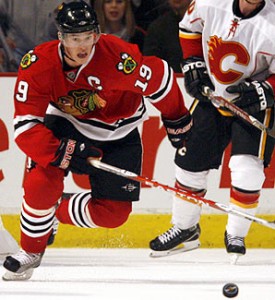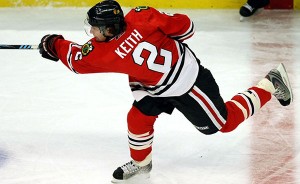With Friday’s 4-0 loss at the hands of the Colorado Avalanche, the Chicago Blackhawks reached the 41-game mark of their season, meaning that half their campaign has come to an end. While the old adage of “time flies when you’re having fun” certainly can apply to a big chunk of those games, the same cannot be said about the way the Hawks ended this stretch of schedule.
Despite being only one point out of the lead in the Central Division, the Hawks have been reeling as of late, dealing with injuries to players like Marcus Kruger and Steve Montador and also losing three games in a row, at least two of which would have been deemed winnable just by looking at the schedule. Falling to the Oilers, Flyers, and Avalanche may not be a season killer by any stretch, but it certainly doesn’t bode well for a team that is going to be getting into a very road-heavy portion of their schedule in the coming weeks.
With that quick recap of where the team is mentally at this point out of the way, here is an evaluation of the way the team has played on the ice overall over the past 41 games, and what it could tell us about the way they could finish the season.
Offense: A-
Unquestionably the strength of the Hawks this season, their offense has been bolstered by some tremendous production from their usual suspects. Jonathan Toews is well on his way to a Hart Trophy caliber season, with 22 goals and 19 assists, and Marian Hossa is having a tremendous season as well, racking up 42 points (17 G, 25 A). Both Patricks are racking up points as well, with Patrick Sharp scoring 19 goals and dishing out 20 assists, and Patrick Kane is leading the team with 27 assists.
The only thing that is really keeping this team from being the league’s best offense is their propensity to go for an extra pass instead of taking a shot, which has been the hallmark of the Joel Quenneville theory on offense in his time in Chicago. When they are putting pucks on net (they are fifth in that category in the NHL), they are nearly unstoppable.
Defense: C
Alas, this team hasn’t shown a great deal of balance between their offense and defense, and that has to be disconcerting for those who picked this team to go far in the playoffs in 2012. Despite allowing the 10th fewest shots on goal in the league this season, the Hawks are 19th in goals against, allowing 2.9 goals per game so far. This has been a testament to the goaltending not quite being up to snuff at times (more about this later), but it is more so an indictment of the quality of scoring chances that they are giving up.
One of the Hawks’ biggest problems in this area has been their inability to get shutdown defense from either of their bottom two pairings. Nick Leddy, who has been very solid on offense, has been getting a lot of pressure put upon himself as he has been paired with Niklas Hjalmarsson on the second pairing, and he has made quite a few mistakes in the process. As a whole, the Hawks have been losing guys on the rush and in front of the net on power plays, and that has complicated matters for both Corey Crawford and Ray Emery.
Power Play: B
The Hawks’ power play has seen more ups and downs within 41 games than the relationships of the Kardashians have (it’s painful to make that comparison, but it’s completely accurate), but for the most part, it’s been pretty solid. They are currently in the middle of the pack in converting with the man-advantage, scoring on 17.8% of their chances. Hossa has been the main guy doing the scoring, with seven tallies to his credit, and Duncan Keith has dished out 10 assists on the man-advantage to lead the club.
As it is with the team’s 5-on-5 offense, the main drawback of their power play unit has been their inability to take shots when they are open to them. There are tons of shots that are being taken with a guy directly in front of the shooter, but they are also taking extra passes and failing to get good quality chances because of it. They are going to have to adjust their mentality in that area if they are going to continue to score well, and they’ll need better production from their second PP unit as well.
Penalty Kill: C
Just like pretty much every other area of the team, the Hawks’ penalty killing group has been inconsistent to say the least. They are just as capable of going six games in a row without allowing a power play goal to allowing five in a two game stretch (they have done both this season), and that inconsistency has led them to near the bottom of the league, ranking 26th with a 78.5% success rate.
The root cause of most of the problems in this area of the ice has been the team’s inability to clear traffic in front of their net. They have also been losing assignments on the ice due to an overeagerness to follow the puck instead of staying on their assignment. Those repeated breakdowns allow guys to skate in unopposed to the middle of the ice, and from there it’s simply a matter of sniping a shot home. They need to improve on their responsibility in a big way if they are going to continue improving in this area.
Goaltending: B-
The Hawks’ goaltending, one of their biggest strengths last season, has been as inconsistent as any other area. While both Emery and Crawford have done a respectable job in keeping pucks out of the net with the defense struggling in front of them, there has still been plenty to question. Both keepers have been unable to show good rebound control, with Emery being an especially egregious offender in this area.
In addition, Crawford has had several games in which he simply looked disinterested, and while it has to be hard to bail out his defense as often as he does, he has to step up his game more often than he has. He is the team’s primary goaltender, and his penchant for giving up soft goals at random intervals this season has been disturbing to say the least.
Overall: B
The Blackhawks’ inconsistency hasn’t kept them from being one of the top teams in the NHL all season, and there is something to be said for that. They have played well a lot this season, but it is absolutely right to question whether or not that inability to put out a consistent 60 minute effort every night will have an adverse effect on the team’s chances of making serious noise in the playoffs.
If Stan Bowman can get a defenseman to put on the team’s second defensive pairing and bump Leddy down to lessen some of the pressure on the youngster, and if they can pick up another solid center so that Kane and Sharp can stay out on the wing where Quenneville prefers them, then this team could very well go deep into the spring, and perhaps have another parade route to plan down Michigan Avenue.

